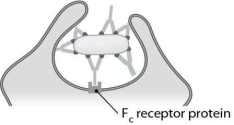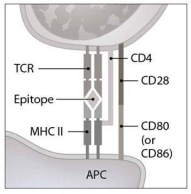Exam 16: Adaptive Immunity
Exam 1: A Brief History of Microbiology75 Questions
Exam 2: The Chemistry of Microbiology76 Questions
Exam 3: Cell Structure and Function80 Questions
Exam 4: Microscopy, Staining, and Classification80 Questions
Exam 5: Microbial Metabolism78 Questions
Exam 6: Microbial Nutrition and Growth75 Questions
Exam 7: Microbial Genetics75 Questions
Exam 8: Recombinant Dna Technology75 Questions
Exam 9: Controlling Microbial Growth in the Environment75 Questions
Exam 10: Controlling Microbial Growth in the Body: Antimicrobial Drugs75 Questions
Exam 11: Characterizing and Classifying Prokaryotes75 Questions
Exam 12: Characterizing and Classifying Eukaryotes75 Questions
Exam 13: Characterizing and Classifying Viruses, Viroids, and Prions75 Questions
Exam 14: Infection, Infectious Diseases, and Epidemiology76 Questions
Exam 15: Innate Immunity75 Questions
Exam 16: Adaptive Immunity75 Questions
Exam 17: Immunization and Immune Testing75 Questions
Exam 18: Aids and Other Immune Disorders75 Questions
Exam 19: Microbial Diseases of the Skin and Wounds72 Questions
Exam 20: Microbial Diseases of the Nervous System and Eyes71 Questions
Exam 21: Microbial Cardiovascular and Systemic Diseases71 Questions
Exam 22: Microbial Diseases of the Respiratory System70 Questions
Exam 23: Microbial Diseases of the Digestive System70 Questions
Exam 24: Microbial Diseases of the Urinary and Reproductive Systems65 Questions
Exam 25: Applied and Environmental Microbiology74 Questions
Select questions type
The white blood cells primarily responsible for adaptive immunity are
(Multiple Choice)
4.7/5  (39)
(39)
The degree to which a molecule is antigenic is largely a function of the (shape/complexity/simplicity/repetition) of the molecule.
(Short Answer)
4.8/5  (35)
(35)
The ability of the body to respond faster and more effectively to a second exposure to pathogens is called immunologic (memory/synapse/tolerance).
(Short Answer)
4.9/5  (39)
(39)
Cytokines are soluble regulatory proteins that act as intercellular signals and include substances such as interleukins, interferon, and growth factors.
(True/False)
5.0/5  (39)
(39)
Which of the following statements regarding the cell-mediated immune response is TRUE?
(Multiple Choice)
4.8/5  (32)
(32)
TCRs only recognize antigens presented by APC; therefore, (BCR/MHC/Th1) molecules ultimately determine which epitopes elicit an immune response.
(Short Answer)
4.8/5  (36)
(36)
 The antibody function known as (agglutination/neutralization/opsonization) is illustrated here.
The antibody function known as (agglutination/neutralization/opsonization) is illustrated here.
(Short Answer)
4.7/5  (45)
(45)
After an initial exposure to a pathogen, the phenomenon of produces a faster, more effective response to subsequent exposures.
(Multiple Choice)
4.8/5  (38)
(38)
 What will be the direct result of the interaction shown in this figure? (This interaction is occurring in a lymph node.)
What will be the direct result of the interaction shown in this figure? (This interaction is occurring in a lymph node.)
(Multiple Choice)
4.8/5  (36)
(36)
What type of immunity is produced by the body when a person contracts a disease?
(Multiple Choice)
5.0/5  (40)
(40)
Virus infections result in activation of B cells as well as activation of Tc cells. Explain how a B cell response to virus may be useful in fighting virus infections.
(Essay)
4.9/5  (36)
(36)
Showing 61 - 75 of 75
Filters
- Essay(0)
- Multiple Choice(0)
- Short Answer(0)
- True False(0)
- Matching(0)